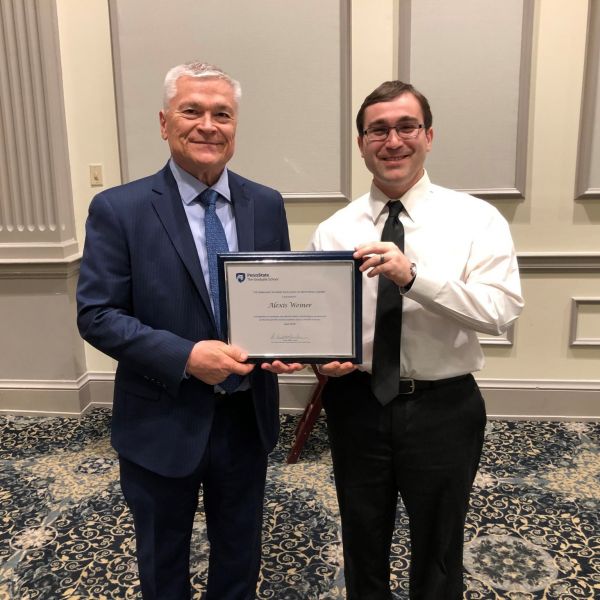Apr 15, 2019
Five Huck Researchers Among Winners at Grad Student Awards
A quintet of Huck doctoral candidates were recognized for excellence in their studies and collaborations within and outside of Penn State.

Five grad students closely connected to the Huck Institutes walked away as winners from the Penn State Graduate Awards on April 11, lauded for their contributions to research, outreach, and mentoring.
Asia Murphy of the Ecology graduate program was given an award for Outreach Achievement. Asia has prioritized making her research—and sometimes, research done by her colleagues—accessible to people without scientific backgrounds, and uses services like Skype and Twitter to engage with broad audiences. She has led and participated in efforts that expose young students to positive and engaging scientific experiences.
"Asia has always been dedicated to outreach and making sure her science (and the science of other ecologists) is communicated to the public," said David Miller, her advisor. "A lot of what she does happens through her writing for popular outlets and social media. She has used twitter as a really effective platform and has more than 10,000 followers. She combines a lot of science with other content in a way that reaches an audience that is a lot more diverse than your average scientist on twitter. Last fall, she gave a lecture in my wildlife management class on the history of colonialism in Africa and its connections to modern-day international conservation policy. She took this and created a twitter thread that summarized the lecture and incorporated many of the pictures and sources used. Within days, it had been retweeted nearly 1,000 times and likely viewed by 10,000 users. I still get a follower every week or two that finds the thread and follows me for no other reason than they see my handle mentioned in reference to the class."
An academic computing fellowship was awarded to Molly Rathbun, a Biochemistry and Molecular Biology grad student heavily involved with the Huck through the Center for Infectious Disease Dynamics, the CBIOS training program, and through the lab of her advisor, Moriah Szpara. Her research involves tracking genetic changes in the populations of herpes viruses that circulate within individuals, and applying statistical analysis to better understand mutations and their impact on clinical outcomes and resistance to treatments.
"I am very fortunate to be researching an area of science that I am truly passionate about, and to do so in such a wonderful environment in the Szpara Lab and my wider Penn State community," said Rathbun. "I’m so excited to continue developing as a scientist, and am very thankful that the support of the Academic Computing Fellowship will help me to do so."
Alex Weiner, an MCIBS student in the lab of Melissa Rolls, received the Mentoring Award. Alex has mentored more than two dozen Penn State undergraduates, improving their skills and developing more sophisticated scientists. He also participates in outreach and skill development programs for teachers and students in Pennsylvania high schools.
"He is willing to help in-lab with whatever you are working on, but he is also willing to help outside of lab if you need support," said one of Weiner's current mentees in his nomination letter. "He will be there for you in any capacity."
"I find it humbling," admitted Weiner. "I was awarded for something I really look forward to doing every day. During the awards ceremony, I found it inspiring how many other people were recognized for awards that had to do with teaching. Being surrounded by people who share in my commitment to developing future students was very rewarding."
Ecology grad student Melanie Allen took home an Alumni Award for her research into how landscapes affect wild bee communities.
Christina Grozinger, distinguished professor of entomology and director of the Center for Pollinator Research, outlined the nature and importance of Allen's studies: "Pollinator populations are declining due to loss of habitat, reduction in the flowering plants they depend on for food, and pesticide exposure. Melanie is examining which landscape factors are most important for supporting diverse pollinators communities, and developing tools which will allow growers, land managers, and conservationists to access this information so that they can develop approaches to support pollinator communities while meeting the food needs of a growing population."
"I'm honored to be selected for this award and grateful to the Penn State Alumni Association for their generosity in sponsoring the award," said Allen. "I have worked on some wonderful teams and wouldn't be here without the support of my advisors, research collaborators, and fellow students."
Ecology grad student Shannon White was recognized as one of the recipients of the Alumni Association Dissertation Award, Distinguished Doctoral Scholar Medal. Shannon's work in Tyler Wagner’s lab focuses on bridging the gaps between modeling population-level characteristics in trout and the behaviors of individual fish, with potential applications for managing populations dealing with the changing climate.
"I’m extremely honored to receive the Alumni Association Dissertation Award," said White. "Essentially, I want to understand how individual fish interact with one another, use habitat, and respond to disturbance. As it turns out, the behavior of only a few individuals is often important for driving much larger population-level processes. Consequently, if we overlook the role of individual variation, we could unintentionally reduce the success of our conservation actions by failing to protect and conserve critical habitats and genotypes. It is my hope that my research will be used to improve the efficacy of fisheries conservation initiatives as well as highlight the importance of intraspecific biodiversity."
Andrew Read, Director of the Huck Institutes, was delighted by the recognition given to the grad students.
"It's terrific to see students in Huck grad programs, in centers, or in the labs of co-funded faculty getting recognized by the university for their outstanding science, outreach work, mentoring skills and research potential," he said. "It's richly deserved."